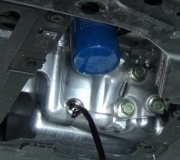Wednesday, June 9th, 2010 AT 1:24 PM
I went to Jiffy Lube to get oil changed and was offered an engine flush, which was told to me would be a good idea since I have never had one. I agreed and a few hours later car started making a loud knocking noise. Took the vehicle back to Jiffy Lube where manager said he noticed the noise shorty after the change/flush but thought it would "work itself out" and suggested he put a thicker oil in car, well needless to say engine locked up half way down the road. I am now suing Jiffy Lube and needed an experts opinion as to what might of caused engine lock up. Jiffy Lube said since I cannot show prooof that they performed last 2 engines changes they are not responsible for damages. Is there not some degree of engine sludge even with regular oil changes for a vehcile with this type of mileage?




